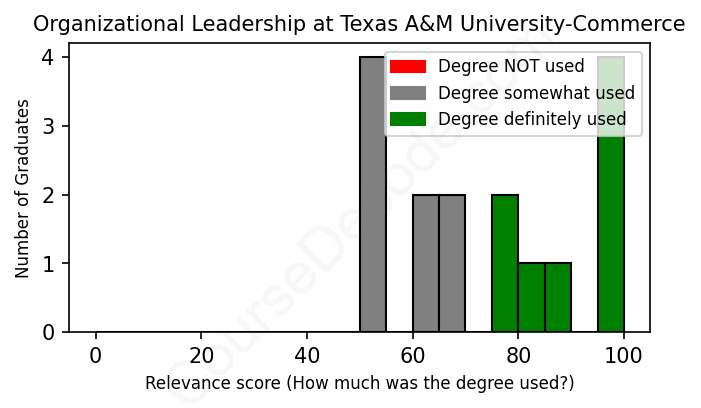
First, some facts. Of the Organizational Leadership graduates from Texas A&M University-Commerce we've analyzed , here's how many have used (or NOT used) their degree in their career:

These are estimates based on AI analysis of 16 LinkedIn profiles (see below).
The verdict? Above average. Overall, with an average relevance score of 74%, Organizational Leadership graduates from Texas A&M University-Commerce have a higher likelihood (+7%) of finding work in this field compared to the average graduate across all fields:
And for comparison, here's the chart for all profiles we've looked at across all degrees.
Also, after graduating, only 18% of these graduates have pursued further education other than another Bachelor's degree (such as a Masters degree or other), compared to the average across all profiles of 35%. This suggests a Bachelors degree is enough for most Organizational Leadership graduates, and it's normal to look for work straight after graduation.
See the details:
|
Relevance score: 64% We think this person has gone into a career only somewhat relevant to their degree. We think this person has gone into a career only somewhat relevant to their degree.
DEGREE INFOGraduated in 2019 from Texas A&M University-Commerce with a Bachelor's degree in Organizational Leadership. No other secondary education since. JOB HISTORY SINCE GRADUATIONLegal Secretary Armbrust & Brown, P.L.L.C. Nov 2020 - Mar 2022 Talent Acquisition Coordinator  Itron, Inc. Mar 2022 - Present ABOUTI'm a passionate and experienced administrator with a proven track record of building and improving business processes. I leverage my strong communication skills to collaborate effectively with diverse teams, optimizing workflows to drive organizational efficiency and success. I thrive in fast-paced environments and relish new challenges. My dedication to continuous improvement ensures I can make a positive and measurable contribution to any organization. |
The top 10 most common jobs done by the graduates we've analyzed (ranked most common to least) are:
From the analysis of various LinkedIn profiles, it seems that graduates with a degree in Organizational Leadership from Texas A&M University-Commerce have taken on a mix of jobs, with some clear trends emerging. Many have gravitated towards roles in the public sector or educational fields, including positions like Program Coordinators, Human Resources Managers, and Project Managers. These positions often involve a blend of leadership and organizational skills, which aligns well with the concepts taught in their degree program. However, it’s noteworthy that not all roles have directly utilized the core principles of Organizational Leadership on a daily basis. For example, some positions like Park Ranger or Security Assistant may overlap with basic leadership skills, but they don’t really dive deep into applying the degree's full scope.
Overall, while many of the roles align with the competencies gained through their studies, there are also a significant number that stray away from core organizational leadership responsibilities. Positions in educational settings, HR, or project management tend to utilize those leadership skills effectively, showcasing a clear link to what they learned in college. Nonetheless, roles in technical fields, administrative settings, or specific public service jobs may not fully leverage the unique perspective provided by an Organizational Leadership degree. It’s a mixed bag, for sure, with some graduates landing jobs that are spot-on relevant, but others taking paths that, while still valuable, don’t fully reflect the emphasis of their education.
Here is a visual representation of the most common words in job titles for Organizational Leadership graduates (this is across all Organizational Leadership graduates we've analyzed, not just those who went to Texas A&M University-Commerce):

Graduates from Texas A&M University-Commerce with a degree in Organizational Leadership seem to have quite diverse career trajectories, often landing roles that align well with their studies. Many of them start their careers in positions that involve management, analysis, or coordination. For instance, a common first job after graduation appears to be entry-level roles in project management or business analysis, particularly within government organizations like the United States Air Force or the Space Force. As they gain experience, their roles tend to progress into leadership positions, where they manage teams or projects, showcasing the effective application of their organizational skills.
Looking a bit further down the line, around 5 to 10 years after graduation, many graduates hold significant positions such as Human Resources Managers, Senior Business Analysts, or even owners of real estate brokerages. It’s encouraging to see that they often ascend to roles that leverage their training in organizational leadership, indicating not just job stability but also growth in the fields they’ve chosen. While there are some who break away into other fields—like teaching or real estate—overall, the trend leans towards successful careers that capitalize on the skills they developed during their degree. So, it looks like Texas A&M University-Commerce graduates are generally doing quite well for themselves!
Hey there! So, a Bachelor’s degree in Organizational Leadership, including the one at Texas A&M University-Commerce, is generally considered to be on the easier side compared to some other degrees, especially if you enjoy working with people and are interested in how organizations function. The coursework often focuses on concepts like communication, team dynamics, and leadership strategies, which can be pretty straightforward if you stay engaged and put in the effort. You might have some projects and presentations, but if you're decent at collaborating and can manage your time well, it’s totally manageable. Just keep in mind that every student’s experience is different, so it really depends on your strengths and interests!
Most commonly, in the LinkedIn profiles we've looked at, it takes people 1 years to finish a Bachelor degree in Organizational Leadership.
Looking at these Texas A&M University-Commerce grads, it seems like a mix of job roles and earning potentials, but overall, they seem to be doing pretty well. The folks who have climbed the ladder in the military and business sectors, like the graduates from 2013 and 2018, probably make good money now, especially with titles like Senior Business Analyst and HR Manager. The healthcare grad from 2015 also likely has a solid income being a Lead Technologist. On the flip side, some roles like teaching at the high school level or entry-level positions right after graduation might not bring in as much initially. But the trend shows that many progress to more lucrative positions over time. So, while not all of them might be raking it in right away, those who’ve been in the workforce for a while seem to be on a promising financial path.
Here is a visual representation of the most common words seen in the "about" section of LinkedIn profiles who have a Bachelor degree in Organizational Leadership (this is across all Organizational Leadership graduates we've analyzed, not just those who went to Texas A&M University-Commerce). This may or may not be useful:

Here are all colleges offering a Bachelor degree in Organizational Leadership (ordered by the average relevance score of their Organizational Leadership graduates, best to worst) where we have analyzed at least 10 of their graduates:
| College | Score | Count |
|---|---|---|
 Texas A&M University-Commerce Texas A&M University-Commerce
|
74 | 16 |
 Arizona State University Arizona State University
|
72 | 23 |
 University of Louisville University of Louisville
|
69 | 10 |
 Purdue University Purdue University
|
67 | 12 |
 University of Charleston University of Charleston
|
67 | 17 |
 University of Cincinnati University of Cincinnati
|
66 | 13 |
 Trident University International Trident University International
|
65 | 10 |
 South Texas College South Texas College
|
65 | 11 |
 Southern Nazarene University Southern Nazarene University
|
63 | 15 |
 Ashford University Ashford University
|
58 | 20 |
 Azusa Pacific University Azusa Pacific University
|
58 | 11 |
 Northern Kentucky University Northern Kentucky University
|
57 | 25 |
 Wright State University Wright State University
|
52 | 24 |